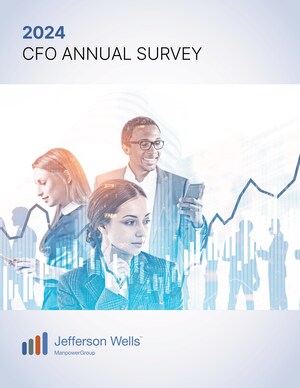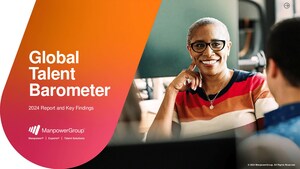LOS ANGELES, Feb. 17, 2012 /PRNewswire/ -- ManpowerGroup (NYSE: MAN) President of the Americas, Jonas Prising, today explained that the changing demographic landscape, the recent global recession, companies' maniacal pursuit of productivity and efficiency and the shifting sands of technology have accelerated the oversupply of available workers and undersupply of talent — resulting in the skills mismatch. ManpowerGroup is the world leader in innovative workforce solutions.
(Logo: http://photos.prnewswire.com/prnh/20110330/CG73938LOGO-a)
Prising addressed The Economist's Human Capital Breakfast in Los Angeles, California, explaining that the world is adjusting to a new ecosystem, identified by ManpowerGroup as the Human Age, in which access to capital has been replaced by access to talent as the key competitive differentiator. The Human Age and notion of Talentism have become the focal point for how government and business leaders explain what is occurring throughout labor markets everywhere.
"We are seeing an increasingly bifurcated world, in which emerging markets are accelerating and mature markets are decelerating, also contributing to the talent mismatch which ManpowerGroup's research shows is a problem for one in three employers worldwide in the face of continuing high unemployment and more generations in the workforce," said Prising. "Companies will only hire when they see demand, not in anticipation of demand. This also means companies are more specific about the skills they need and focused on hiring only the best talent when they do hire."
Prising and his fellow panelists discussed the 2012 global economic outlook in the face of continuing geopolitical uncertainty and the challenge of accessing highly skilled workers in the face of talent mismatches. Justine Thody, Editorial Director for the Americas at the Economist Intelligence Unit, moderated the panel and provided a global economic outlook for the next five years. Panelists joining Prising were Ana Dutra, CEO, Leadership and Talent Consulting, Korn Ferry International, who discussed retaining talent and building a pipeline; and Jonathan Speight, Regional Head of HR in Latin America for HSBC, who spoke to the business angle of attracting talent in foreign markets.
The rapid evolution of technology is the unpredictable "shifting sand" of the employment landscape, allowing for increased interconnectivity, efficiency and productivity but also creating a need for employers to be more transparent. Due to "infobesity" — that is, so much relevant information exists that it is difficult to filter to get at the critical pertinent information to make decisions — there is a correlation to the dichotomy between macro-economic data and companies' understanding of the reality of micro labor markets. In China, for example, there is in theory an almost inexhaustible supply of 1.3 billion people but in reality there may only be 300 million people with the right skills.
Companies can no longer assume labor arbitrage benefits in emerging markets, as that chapter is drawing to a close. However, ManpowerGroup's research shows it is not necessarily about compensation packages either as Chinese workers, for who career development is a key driver of employee engagement and retention, are increasingly favoring Chinese companies over multinationals.
"In the Human Age, business is global, talent is mobile and more importantly labor markets are local," added Prising. "Whether companies are seeking talent in Beijing or Sao Paolo, they need to have the same micro-understanding of the local labor market. Workers in Brazil are gravitating toward local companies for the same reasons. In a world challenged by talent paradox, domestic demand grows in tandem with a new consumer class there, ratcheting up the need for companies to take an active role in finding new ways to attract, develop and unleash the potential of the people they need."
An increasingly bifurcated world, in which emerging markets are accelerating and mature markets are decelerating, is exacerbating the talent conundrum. In order to remain competitive in the Human Age, the U.S. must practice better private and public partnership collaboration across the board. Over half of U.S. employers report difficulty in filling mission-critical positions.
"While there is no one-size-fits-all solution to the problem, it cannot be resolved in silos. Businesses, education and governments have a vested interest in working together to create a better skills match," added Prising. Technology moves fast, and business moves faster. Education can only keep pace with the skills business demands if business itself has a stake in the future of skills."
These insights are among those that ManpowerGroup released in the new research paper, "How to Navigate the Human Age," at last month's World Economic Forum Annual Meeting in Davos, Switzerland. Prising was part of ManpowerGroup's delegation at Davos, where WEF Founder and Executive Chairman, Klaus Schwab, echoed ManpowerGroup's sentiment that talentism is the new capitalism, showing that, one year on from ManpowerGroup's identification of this new ecosystem, the concept is resonating.
"How to Navigate the Human Age" is available for download at: http://www.manpowergroup.com/research/research.cfm
About ManpowerGroup
ManpowerGroup™ (NYSE: MAN), the world leader in innovative workforce solutions, creates and delivers high-impact solutions that enable our clients to achieve their business goals and enhance their competitiveness. With over 60 years of experience, our $22 billion company creates unique time to value through a comprehensive suite of innovative solutions that help clients win in the Human Age. These solutions cover an entire range of talent-driven needs from recruitment and assessment, training and development, and career management, to outsourcing and workforce consulting. ManpowerGroup maintains the world's largest and industry-leading network of nearly 3,900 offices in over 80 countries and territories, generating a dynamic mix of an unmatched global footprint with valuable insight and local expertise to meet the needs of its 400,000 clients per year, across all industry sectors, small and medium-sized enterprises, local, multinational and global companies. By connecting our deep understanding of human potential to the ambitions of clients, ManpowerGroup helps the organizations and individuals we serve achieve more than they imagined – because their success leads to our success. And by creating these powerful connections, we create power that drives organizations forward, accelerates personal success and builds more sustainable communities. We help power the world of work. The ManpowerGroup suite of solutions is offered through ManpowerGroup™ Solutions, Manpower®, Experis™ and Right Management®. Learn more about how the ManpowerGroup can help you win in the Human Age at www.manpowergroup.com.
ManpowerGroup is the most trusted brand in the industry, being the only company in our industry to be named to the Ethisphere Institute's 2011 World's Most Ethical Companies list for our proven commitment to ethical business practices, including an outstanding commitment to ethical leadership, compliance practices and corporate social responsibility. In addition, ManpowerGroup has also been recognized as the industry leader by Fortune magazine, who named the company in first place on its 2011 list of the Most Admired Companies in the temporary help sector.
In January 2011, at the World Economic Forum Annual Meeting in Davos, Switzerland, ManpowerGroup announced the world has entered the Human Age, where talent has replaced capital as the key competitive differentiator. This concept of talentism as the new capitalism continues to resonate and was echoed as a core theme of the 2012 Annual Meeting of the World Economic Forum in Davos. Learn more about this new age at www.manpowergroup.com/humanage
Gain access to ManpowerGroup's extensive thought leadership papers, annual Talent Shortage surveys and the Manpower Employment Outlook Survey, one of the most trusted indices of employment activity in the world, via the ManpowerGroup World of Work Insight iPad application. This thought leadership app explores the challenges faced by employers navigating the changing world of work and provides in-depth commentary, analysis, insight and advice on strategies for success.
Follow ManpowerGroup Chairman and CEO Jeff Joerres on Twitter: twitter.com/manpowergroupjj. Joerres is one of only six Fortune 500 CEOs who leverages a Twitter account to get his message out.
SOURCE ManpowerGroup
WANT YOUR COMPANY'S NEWS FEATURED ON PRNEWSWIRE.COM?
Newsrooms &
Influencers
Digital Media
Outlets
Journalists
Opted In






Share this article